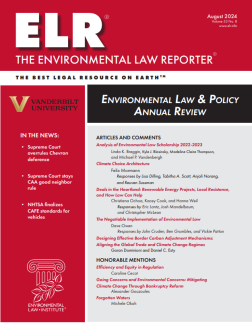2024 Issue of the Environmental Law and Policy Annual Review

The Environmental Law and Policy Annual Review (ELPAR) is published annually in the August issue of The Environmental Law Reporter (ELR) in collaboration with Vanderbilt University Law School (VULS) and ELI. Each year, Vanderbilt Law students work with an expert advisory committee, senior staff from ELI, and Vanderbilt law professors to identify some of the year’s best academic articles that include creative and feasible law and policy proposals.








